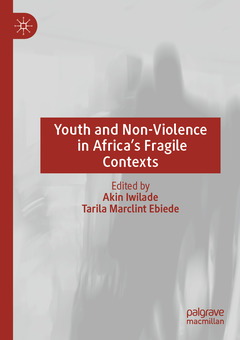Description
Youth and Non-Violence in Africa’s Fragile Contexts, 1st ed. 2022
Coordinators: Iwilade Akin, Ebiede Tarila Marclint
Language: English
Subject for Youth and Non-Violence in Africa’s Fragile Contexts:
Keywords
Publication date: 10-2023
191 p. · 14.8x21 cm · Paperback
Publication date: 10-2022
191 p. · 14.8x21 cm · Hardback
Description
/li>Contents
/li>Biography
/li>Comment
/li>
This book makes an important contribution to the conflict literature and to new ways of thinking about agency and social life in fragile contexts. It does this by engaging with often ignored peace infrastructures. In this book, the contributors highlight different ways in which non-violence is deployed by Africa?s youth to navigate difficult violent contexts. Drawing on empirically grounded case studies from the Central African Republic to Zimbabwe, this book explores how similar (or indeed the same) social infrastructures can be deployed for both violence and non-violence and the important factors that drive many youth to take the non[1]violence option even when order appears to collapse around them. The authors also explore how, for instance, systems of organizing survive violent disruptions to the so-called rhythms of everyday life, and, when they do, how they are then repurposed by youth to help them survive violence.
Akin Iwilade is a Lecturer in African Studies at the University of Edinburgh, Scotland, and conducts research on the anthropology of youth and gangs in Africa.
Tarila Marclint Ebiede is a Political Scientist. He is co-founder of Conflict Research Network West Africa. He is also an Adjunct Lecturer at the University of Kent’s Brussels School of International Studies and the Brussels School of Governance, both in Belgium.
Offers critical interdisciplinary insights into the politics of marginal categories in Africa
Explores the social navigation of youth within Africa’s complex political contexts
Analyzes cases that explore a wide range of national contexts—from the Central African Republic to Zimbabwe



